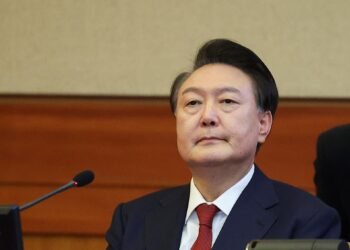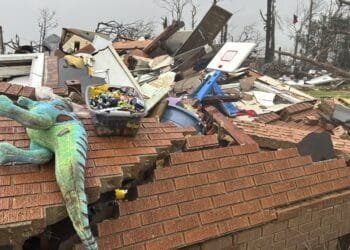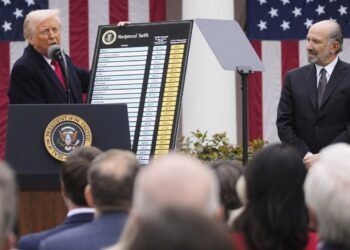DHAKA, Bangladesh (news agencies) — Bangladesh’s main opposition party was holding a public rally in the nation’s capital Wednesday as the country was preparing to form an interim government led by a Nobel laureate, after a mass uprising that left hundreds of people dead and forced the former Prime Minister Sheikh Hasina to step down and flee the country.
The student leaders, who organized the weeks of mass protests, said they would unveil a full list of the new Cabinet on Wednesday. The streets of Bangladesh were calm after reports of violence against supporters of Hasina, police and minority communities which followed soon after she fled to India.
The rally by the Bangladesh Nationalist Party — led by former Prime Minister Khaleda Zia, Hasina’s archrival — came a day after her release from house arrest, amid a new political environment in the country.
Zia’s freedom is largely symbolic as the ailing leader has been staying outside the prison under an executive order of the former government but was not allowed to travel abroad. Her son and the acting head of the party, Tarique Rahman, is expected to address the crowd online from his home in London, where he has been living in exile since 2008. He faces several criminal cases.
Zia, who ruled the country from 2001 to 2006, was convicted on corruption charges in 2018 and sentenced to 17 years in prison. Her party said the charges were politically motivated to keep her away from politics.
The rally started in the afternoon but thousands of Zia’s supporters started gathering in front of its party headquarters in Dhaka’s Naya Paltan area from before noon for the rally.
Bangladesh’s President Mohammed Shahabuddin, a symbolic figure who is acting as the chief executive now under the constitution, dissolved Parliament on Tuesday, clearing the path for an interim administration that is expected to schedule new elections but it’s not clear when those elections will take place.
Shahabuddin named Nobel laureate Muhammad Yunus as the head of an interim government, in consultation with the army and student leaders. He has been a longtime opponent of Hasina.
An economist and banker, Yunus was awarded the 2006 Nobel Peace Prize for his work developing microcredit markets. He has been hailed for bringing thousands out of poverty through Grameen Bank, which he founded in 1983, and which makes small loans to businesspeople who wouldn’t qualify for regular bank loans.
In his first statement since he was named as the head of an interim government, Yunus on Wednesday congratulated the students for “taking the lead in making our Second Victory Day possible.” He also appealed to them, members of political parties and other people to stay calm.
Referring to acts of violence that happened after Hasina’s resignation, Yunus said, “Violence is our enemy. Please don’t create more enemies. Be calm and get ready to build the country.”
Yunus is now at Paris airport to catch a flight home. He had been at the Olympics.
On Wednesday, the streets of Dhaka, the capital, were calm two days after violence gripped the country amid Hasina’s sudden departure. The students were seen cleaning streets and managing traffic in parts of Dhaka as police including traffic police disappeared amid violent attacks on police stations in Dhaka and elsewhere in the country.
The looting of the firearms was also reported in local media. Reports of robberies in parts of Dhaka came in the absence of police.
The Bangladesh Police Association went on strike after police stations and security officials were attacked across the country Monday. The association said “many” officers had been killed but gave no number.
Violence in days surrounding Hasina’s resignation killed at least 109 people — including 14 police officers, and left hundreds of others injured, according to media reports, which could not be independently confirmed. Reports said more attacks took place across the country also on Tuesday.
In the southwestern district of Satkhira, 596 prisoners and detainees escaped from a jail after an attack on the facility Monday evening, the United News of Bangladesh agency reported.
Many of the homes of the ministers and MPs for the ruling party were looted, torched or vandalized. People were seen on social media taking valuables from the home of Hasina’s younger sister in Dhaka’s Gulshan area. Four separate neighbors told media that the lootings took place at her home.
Elsewhere in Dhaka, charred bodies were recovered from a museum, which was used by Hasina’s father before he was assassinated along with most of his family in 1975, media reports said.
Local media also reported that many of the dead in two days of violence since her resignation included ruling party officials, mostly outside Dhaka. Those details could not be independently confirmed.









 United Arab Emirates Dirham Exchange Rate
United Arab Emirates Dirham Exchange Rate

